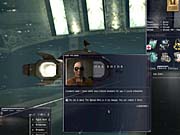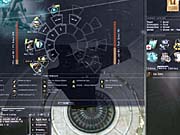EVE: The Second Genesis Preview
We take an updated look at CCP's forthcoming online game about trading, exploring, and fighting in space.
These days, nearly all online role-playing games have some features that encourage players to form a community. Though some games make only minimal effort in this regard, others have more-developed features that help encourage players to cooperate. But you might argue that no other massively multiplayer game makes player cooperation as important as EVE: The Second Genesis does. This online role-playing game is set in outer space, in a futuristic universe of more than 5,000 star systems, populated by players in spaceships--though unlike some other games, EVE will constantly encourage players to work together for their own benefit.
Developer CCP has so much faith in its player community that it expects the game's economy to eventually be driven entirely by the players (who can form in-game "corporations"), without artificial pricing interference from any computer-controlled nonplayer characters (NPCs). Considering the fact that even in its beta state--there are about 30,000 play testers currently helping to balance and tweak the game--EVE already has more than 400 player-run corporations, this ambitious idea might well become reality. The developers promise that EVE will be able to support 100,000 players in the same universe, without the need to separate chunks of the population onto separate servers as in other online role-playing games.

EVE will offer players a number of different opportunities to cooperate with each other. Many items in the game, such as weapons and ammunition, must be manufactured. Manufacturing an item requires a blueprint (which can be purchased or researched by players with scientific skills), which is essentially a recipe of different raw materials that can be refined from various types of asteroid ore. This creates a clear connection between craftsman players and miners. Freighters carrying valuable cargoes of rare refined materials make attractive targets for pirates, an example of the interdependence between cargo haulers and friendly combat fighters. But the weapons, armor, shield generators, and special devices used by military ships all need to be manufactured by tradesmen themselves.

Corporations that become wealthy through their commercial activities will eventually be able to earn money in even more creative ways. Given enough cash, a corporation can purchase its own space station, complete with its own defensive turrets and structures for protection. The corporation can then charge fees to any player who wants to dock at the station and do business, or charge a rental fee for the use of factory space on the station (used for manufacturing items). Excess money can be granted to scientist players in the corporation to assist them in researching new items and in creating brand-new blueprints. The corporation can then sell copies of a blueprint to make money or keep it for themselves and try to monopolize the production and sale of the new item.
A Universe of Possibilities
Player-generated missions will be a central part of EVE's gameplay. If you hijack a rival corporation's shipment, you can be sure it will seek revenge by putting a ransom on your head. Bounty hunting will probably be a popular profession for lone-wolf players in EVE (currently, the only type of player-generated mission that can be created is a bounty mission). The developers plan to expand on EVE's mission types to allow for more types of tasks, such as cargo hauling or reconnaissance for new ore asteroids. The ability for players or corporations to create such missions will likely be crucial to the player-run economy.

All of the possibilities for corporations and player cooperation sound well and good, though at this point, EVE seems to be a remarkably complex game that really does depend on getting players to cooperate well and fairly. To succeed, corporations may have to tax their own members in order to buy goods and services to benefit the entire organization. EVE currently does let members of a corporation contribute to their company's coffers, but it remains to be seen how corporations will be able to enforce these taxes, and whether corporate executives can be trusted to distribute these funds fairly. It also remains to be seen whether the pace of weapon and manufacturing research will be enough to drive the entire universe's economy. CCP intends to launch the game with preset economic factors, including some artificial pricing as well as some NPC-generated missions that will help get players started. However, the developer sees these artificial features as a crutch, and it intends to minimize or even remove these features after launch to let players drive the economy entirely on their own. It will indeed be interesting to see how well this economy works and, in a larger sense, how casual, inexperienced players will be able to participate in the economy and other factors in this complex game.

EVE will feature 5,000 star systems to explore (and many planets, moons, and space stations within them), hundreds of different types of ore, refined materials, weapons, and items that can be bought and sold via brokers in the commodities market, and a surprisingly large number of buttons in the game's interface. At this point, it seems that new players might find EVE's many features to be almost as overwhelming as they are intriguing.
Fortunately, CCP has been hard at work adding in-depth tutorials to EVE to make starting out a less intimidating prospect. Perhaps the most encouraging part of these efforts is a volunteer system called Polaris. Polaris volunteers will be real players who are experienced in the world of EVE, and they'll be on hand, orbiting around in the beginner areas to provide live help to new players who are just getting started. Assuming this system works as intended, it will provide a great help to casual players looking for a little direction in the world of EVE. Casual players and veteran adventurers alike will be able to try the game themselves when EVE launches this May.
Got a news tip or want to contact us directly? Email news@gamespot.com
Join the conversation